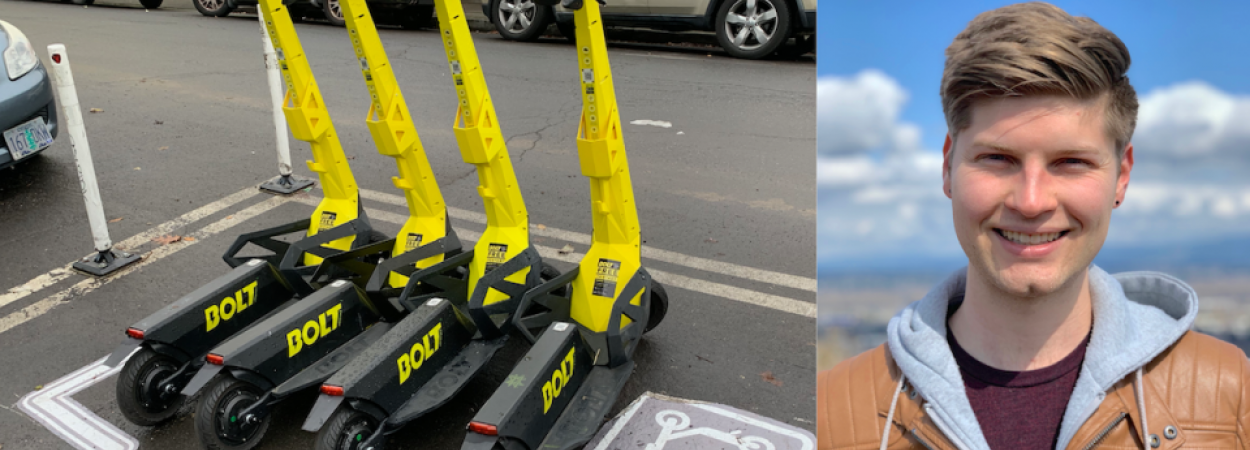Portland State University graduate Mike McQueen, who earned his masters in civil engineering in 2020 and now works at ICF as a transportation data specialist and engineer, has published an article in the November 2022 issue of Transportation Research Part A: Policy and Practice.
The article, "Assessing the perception of E-scooters as a practical and equitable first-mile/last-mile solution," is a revised version of McQueen's masters thesis, "Comparing the Promise and Reality of E-Scooters: a Critical Assessment of Equity Improvements and Mode-Shift," which is available for download on PDX Scholar. The article updates the statistical model used to a mixed multinomial (MMNL) regression model, which allows for better control of random variations in taste among respondents, and makes findings about the influence of travel time and cost on mode choice more robust. McQueen presented this research during a poster session at the TRB Conference on Advancing Transportation Equity (CATE) conference in September 2021.
"This research shows that e-scooter systems in their current form are not organically leading to substantial mode shift from automobile travel at a regional scale, nor are they leading to increased gender or racial transportation equity," McQueen said.
E-scooters have disrupted and altered the urban mobility landscape. During their introductory period, they have been commonly touted as part of a larger micromobility solution that erases equity barriers and solves the first-mile/last-mile problem. However, few studies in the nascent e-scooter literature have considered these claims. In this study, McQueen designed and administered a stated choice experiment to 1,968 students at Portland State University. Results indicated that e-scooters were lackluster in bringing racial and gender equity in transportation. A few highlights from the findings:
- There was no place in the study area where combining an e-scooter and light rail to travel to the downtown university campus was more utilitarian than biking or private car at current travel times and prices.
- Black students were 15% less likely than white students to choose e-scooter and light rail instead of car in the stated choice experiment.
- Female students were 59% less likely than male students to choose e-scooter and light rail instead of car in the stated choice experiment.
- Transit travel time was the strongest direct elasticity to changing the e-scooter and light rail choice probability.
- Parking cost was the strongest car mode cross elasticity to changing the e-scooter and light rail choice probability.
"It is important to not leave our transit system behind when incorporating micromobility into a region – in fact, the variable with the largest impact on e-scooter + light rail mode choice preference was the travel time for the light rail portion of the trip. Decreasing travel time led to a significant increase in preference," McQueen said.
He suggests that E-scooter services that incentivize a more targeted use case for replacing automobile travel, such as connecting a suburban area to a light rail station, could be more influential in reducing urban automobile travel to downtown, especially if travel times and prices are competitive. One way to achieve this use case could be price incentives or discounts to encourage this multimodal behavior in specific areas near stations.
During his time at PSU, McQueen worked with TREC Sustainable Transportation Program Manager John MacArthur on a number of micromobility and e-bike studies, including the development of an electric vehicle cost and impact tool and the expansion of e-bike incentive programs. He received various scholarships and awards including two Eisenhower Fellowships, and his work on bike share and first mile/last mile travel behavior led to a YPT national Streetlight graduate fellowship. Now at ICF, Mike is working to make cities more equitable, sustainable and multimodal through data-driven policy and design.
Connect with Mike on LinkedIn.
Portland State University's Transportation Research and Education Center (TREC) is home to the U.S. DOT funded National Institute for Transportation and Communities (NITC), the Initiative for Bicycle and Pedestrian Innovation (IBPI), PORTAL, BikePed Portal and other transportation grants and programs. We produce impactful research and tools for transportation decision makers, expand the diversity and capacity of the workforce, and engage students and professionals through education and participation in research.




